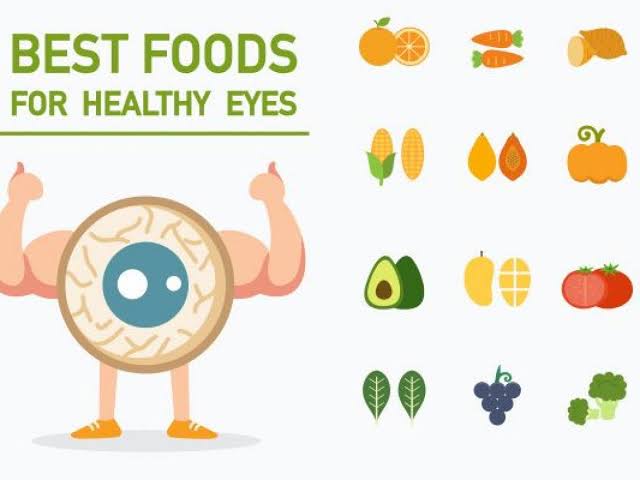
How to Keep Your Eyes Healthy;
Don’t take your eyes for granted. Take these easy steps to keep your eyes healthy.
- Eat Well
Good eye health starts with the food on your plate. Nutrients like omega-3 fatty acids, lutein, zeaxanthin, zinc, and vitamins C and E might help ward off age-related vision problems like macular degeneration and cataracts.
A well-balanced diet also helps you stay at a healthy weight. That lowers your odds of obesity and related diseases like type 2 diabetes, which is the leading cause of blindness in adults.
These nutrients are gotten from our daily food which includes;
– Fish
Many fish are rich sources of omega-3 fatty acids.
Oily fish are fish that have oil in their gut and body tissue, so eating them offers higher levels of
omega-3-rich fish oil. The fish that contains the most beneficial levels of omega-3s include:
tuna, salmon, trout, mackerel, sardines, anchovies, herring.
Some studies have found that fish oil can reverse dry eye, including dry eye caused by spending too much time on a computer.
– Nuts and legumes
Nuts are also rich in omega-3 fatty acids. Nuts also contain a high level of vitamin E, which can protect the eye from age-related damage.
Nuts and legumes that are good for eye health include:
wallnuts, Brazil nuts, cashews, peanuts, lentils.
– Seeds
Like nuts and legumes, seeds are high in omega-3s and are a rich source of vitamin E.
. Seeds high in omega-3 include:
chia seeds, flax seeds, hemp seeds.
– Citrus fruits
Citrus fruits are rich in vitamin C. Just like vitamin E, vitamin C is an antioxidant that is recommended to fight age-related eye damage.
Vitamin C-rich citrus fruits include, lemons, oranges, grapefruits,
– Leafy green vegetables
Leafy green vegetables are rich in both lutein and zeaxanthin and are also a good source of eye-friendly vitamin C.
Well-known leafy greens include:
spinach, kale, collard
– Carrots
Carrots are rich in both Vitamin A and beta carotene. Beta carotene gives carrots their orange color.
Vitamin A plays an essential role in vision. It is a component of a protein called rhodopsin, which helps the retina to absorb light.
– Sweet potatoes
Like carrots, sweet potatoes are rich in beta carotene. They are also a good sourceoftheantioxidant vitamin E.
– Beef
Beef is rich in zinc. Zinc can help delay age-related sight loss and macular degeneration.
The eye itself contains high levels of zinc, particularly in the retina, and the vascular tissue surrounding the retinal
Meats such as chicken breast and pork loin also contain zinc, but at lower levels than beef.
– Eggs
Eggs are an excellent source of lutein and zeaxanthin, which can reduce the risk of age-related sight loss. Eggs are also good sources of vitamins C and E, and zinc.
– Water
It may come as no surprise that a fluid essential to life is also vital to eye health.
Drinking plenty of water can prevent dehydration, which may reduce the symptoms of dry eyes.
RECOMMENDED DAILY INTAKE
The current daily recommendations for healthy eye nutrients, as suggested by the AAO to slow the progression of eye disease, are:
500 milligrams (mg) of vitamin C
400 international units of vitamin E
10 mg lutein
2 mg zeaxanthin
80 mg of zinc oxide
2 mg of copper oxide
- Quit Smoking
In truth, a healthy lifestyle can significantly reduce the risk of eye health problems.
Smoking has long been known to cause heart disease and lung cancer; however many people don’t realize that smoking can lead to vision loss. Studies show smoking increases the risk of age-related macular degeneration, cataracts, glaucoma and diabetic retinopathy and Dry Eye Syndrome.
- Stop too much intake of caffeinated drinks
For many of us, caffeine is part of our daily routine, and drinking a cup of coffee first thing in the morning is a must. According to the NHS, drinking coffee carries no health risk, however, too much of it (as with anything) can be bad for you.
Drinking too much caffeine may affect your eyes in several ways. Some find that consuming large amounts of coffee reduces tear production and causes dry eyes. This includes symptoms of discomfort and a burning or gritty sensation. Over time, if dry eyes are not treated, through reduced caffeine intake or medical help, chronic dry eyes can lead to a greater risk of eye infections, blurred vision and photophobia (light sensitivity) and make your eyes more susceptible to scratches.
One study found that the risk of developing glaucoma is greater in individuals who drink more than four cups of coffee (400mg caffeine) per day. However, we must also consider other factors including age, weight, health and smoking habits, which have contributed towards the findings.
Excessive consumption of coffee or caffeinated beverages can suddenly increase blood sugar levels, which can lead to blurred vision or spasms of the eyelid (jumping eye).
Research shows that drinking caffeinated drinks, especially coffee, can not only raise your blood pressure but also causes eye pressure to increase. This is true from even just one cup of coffee a day and strongly suggests that drinking more than four cups of caffeinated coffee might not be good for your eye.
- Reduce too much intake of Alcohol
Alcohol weakens the muscles of the eyes and can permanently damage the optic nerve which transmits visual images to the brain. Prolonged alcohol use can cause involuntary rapid eye movement.
Alcohol slows down the communication between the eyes and the brain. This can cause double vision, decrease reaction time of pupils and impair the ability to see color.
Alcohol dilates ocular blood vessels, which makes them look larger and gives the eyes a reddish color.
Alcohol can make the eyes extremely sensitive to light and cause migraine headaches. health.
